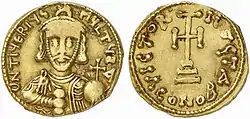Tiberius Petasius
Tiberius Petasius was a Byzantine usurper in Italy c.730/731.
| Tiberius Petasius | |||||||||
|---|---|---|---|---|---|---|---|---|---|
| Usurper of the Byzantine Empire | |||||||||
 Solidus minted in Tiberius' name | |||||||||
| Reign | c.730/731 | ||||||||
| Predecessor | Leo III | ||||||||
| Successor | Leo III | ||||||||
| Died | 730/731 | ||||||||
| |||||||||
History
Very little of Tiberius' life is known, other than that he was born Petasius,[1] and that he revolted against the Byzantine Emperor Leo III the Isaurian (r. 717–741)[2] in either 730 or 731,[3][4] in Tuscia, Italy,[5][6] taking the regnal name Tiberius.[1] It is possible that he was acclaimed as emperor by local Italian assemblies, who subsequently lost heart when the rebellion of Agallianos Kontoskeles in Greece was crushed.[7] Tiberius gained the allegiance of several towns near Tuscia, including Castrum Manturianense (identified by the historian Ludovico Muratori as modern-day Barbarano Romano), Blera, and Luna (modern-day location unknown, but likely not the Luna in northern Etruria); Tiberius based himself out of Castrum Manturianense.[4]
The Exarch of Ravenna, Eutychius (r. c.727 – 751), was sent to suppress Tiberius' revolt. Eutychius was short on manpower, thus Pope Gregory II (r. 715–731), who did not support Leo III, but opposed the creation of rival emperors, sent several bishops, as well as Papal forces to support Eutychius.[2][5][6] Their combined armies marched to Castrum Manturianense, crushed the rebellion in battle, and killed Tiberius.[4][5][6] After killing Tiberius, Eutychius sent his head to Leo III.[2]
The issue of Iconoclasm may have played a part in Tiberius' revolt, with Tiberius deriving support from Italians who opposed Leo III's iconoclastic policies,[8] although the only source which states that the anti-Iconoclastic sentiment of the Italians was related to the revolt of Tiberius comes from a much later anti-Iconoclast.[9]
References
Citations
- Hodgkin 1895, p. 459.
- Noble 1984, p. 37.
- Nicholson 2018, p. 1178.
- Hodgkin 1895, p. 460.
- Hollingsworth 1991.
- Richards 1979, p. 221f.
- Finlay 1877, p. 40.
- Saxby & Angelov 2016, p. 39.
- Brubaker & Haldon 2011, p. 83.
Bibliography
- Brubaker, Leslie; Haldon, John (2011). Byzantium in the Iconoclast Era, C. 680-850: A History. Cambridge: Cambridge University Press. ISBN 9780521430937.
- Finlay, George (1877). A History of Greece from Its Conquest by the Romans to the Present Time, B.C. 146 to A.D. 1864: The Byzantine Empire, pt. 1, A.D. 716-1057. Dallas: AMS Press. ISBN 9780404023904.
- Hodgkin, Thomas (1895). Italy and Her Invaders: The Lombard kingdom, 600–744 (2nd ed.). Cambridge: Harvard University. OCLC 5080433.
- Hollingsworth, Paul A. (1991). "Eutychios". In Kazhdan, Alexander (ed.). The Oxford Dictionary of Byzantium. Oxford and New York: Oxford University Press. pp. 759–760. ISBN 0-19-504652-8.
- Nicholson, Oliver (2018). The Oxford Dictionary of Late Antiquity. Oxford: Oxford University Press. ISBN 9780192562463.
- Noble, Thomas F. X. (1984). The Republic of St. Peter: The Birth of the Papal State, 680–825. Philadelphia: University of Pennsylvania Press. ISBN 9780812212396.
- Richards, Jeffrey (1979). The Popes and the Papacy in the Early Middle Ages, 476–752. London and Boston: Routledge & Kegan Paul. ISBN 0-7100-0098-7.
- Saxby, Michael; Angelov, Dimiter (2016). Power and Subversion in Byzantium: Papers from the 43rd Spring Symposium of Byzantine Studies, Birmingham, March 2010. Abingdon: Routledge. ISBN 9781317076933.